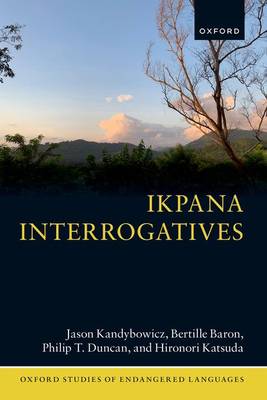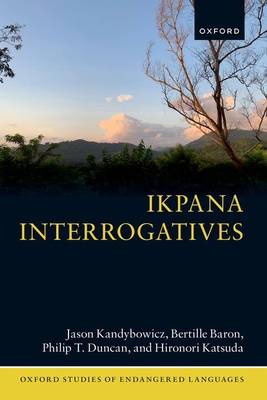
- Afhalen na 1 uur in een winkel met voorraad
- Gratis thuislevering in België vanaf € 30
- Ruim aanbod met 7 miljoen producten
- Afhalen na 1 uur in een winkel met voorraad
- Gratis thuislevering in België vanaf € 30
- Ruim aanbod met 7 miljoen producten
Zoeken
€ 161,45
+ 322 punten
Omschrijving
This book documents the interrogative system of Ikpana, an endangered indigenous Ghana-Togo Mountain language of eastern Ghana also known as Logba. The system is notable in several respects. It exhibits features that buck certain typological trends, act as counterexamples to some claims about language universals, and exemplify fascinating patterns that are either rare or unfamiliar in interrogative systems cross-linguistically. Drawing on original fieldwork and a combination of formal/theoretical, experimental, and comparative methodologies, the book provides a theoretically-informed description and analysis of Ikpana interrogative grammar, encompassing both syntactic and phonological aspects of question formation in the language. The chapters explore a range of phenomena including polar question formation, wh- movement, wh- in-situ, interrogative intonation, and prosody, among others. The authors demonstrate that theoretically-guided language documentation does not only contribute to language description, but can also increase understanding of the human Language Faculty and expand the empirical base of language typologies: bringing formal and theoretical concerns to the fore facilitates richer descriptions of the grammar than purely descriptive approaches allow.
Specificaties
Betrokkenen
- Auteur(s):
- Uitgeverij:
Inhoud
- Aantal bladzijden:
- 224
- Taal:
- Engels
- Reeks:
Eigenschappen
- Productcode (EAN):
- 9780192845009
- Verschijningsdatum:
- 16/06/2023
- Uitvoering:
- Hardcover
- Formaat:
- Genaaid
- Afmetingen:
- 163 mm x 231 mm
- Gewicht:
- 498 g

Alleen bij Standaard Boekhandel
+ 322 punten op je klantenkaart van Standaard Boekhandel
Beoordelingen
We publiceren alleen reviews die voldoen aan de voorwaarden voor reviews. Bekijk onze voorwaarden voor reviews.








